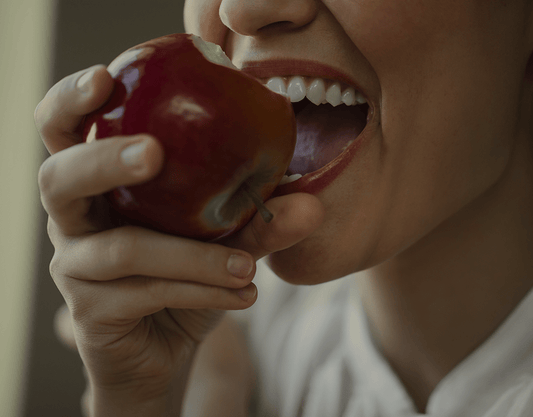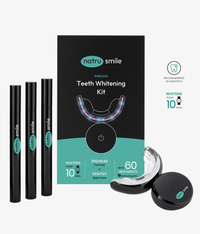
All products are certified by dental expert Dr. Greg Grillo
The benefits of white teeth are numerous - not only is it aesthetically pleasing, but having a whiter smile can also indicate better oral hygiene. And the added confidence boost never hurts either.
But no toothpaste alone can whiten teeth - even the nice-looking anticavity toothpaste you see at the store has its limitations. And the cost of teeth whitening has forced many people to look for cheaper alternatives.
We all know "an apple a day keeps the doctor away," but what about your dentist?
In this article, we'll take a closer look at the benefits of apples and how they pertain to your dental health.
Why Do People Think Apples Can Make Teeth Whiter?
The idea of using an apple to whiten teeth has been around for decades, though it's only recently that people are questioning whether or not there's any truth to the claim.
So why do people think apples can help with teeth whitening in the first place?
Apples are rich in dietary fiber, antioxidants, and vitamins, making them a healthy snack. Dietary fiber helps to facilitate digestion, while antioxidants help to reduce inflammation and oxidative stress, which can damage cells and lead to disease. They are also high in vitamin C and other essential vitamins that help maintain normal body functions like immunity and metabolism.
Since they offer countless health benefits, including reduced inflammation, a stronger immune system, and better digestion, it's no surprise that people began to consider them for dental health.
Do Apples Really Whiten Teeth?
Most teeth whitening fads don't work. Some people use banana peels for teeth whitening, claiming that rubbing the peels against the teeth can help to remove surface stains and discoloration. This isn't particularly bad for your teeth (especially since it's usually done before regular brushing), but it doesn't actually whiten teeth, either.
Some whitening options are actually dangerous. Using orange peels to whiten your teeth seems good in theory, but the citric acid in the peel can actually damage your enamel, something that toothpaste cannot repair.
In the case of apples, there isn't much scientific evidence to back up their effectiveness as a whitening agent. However, there's still a chance that it can help.
Like strawberries, apples contain malic acid, which is an alpha-hydroxy acid (AHA). AHAs are commonly used in skin care products to exfoliate and brighten the skin. Their whitening properties also make them natural teeth whiteners, according to PubMed research.
Chewing on apples can also reduce salivary bacteria in your mouth (which can discolor your teeth), and their fibrous texture helps to scrub away surface stains.
Contrary to popular belief, apples do not reduce the plaque on your teeth, but the reduction in salivary bacteria is similar to that of brushing your teeth.
In short, apples are a natural teeth whitener, but they are not a substitute for regular oral care. They still have sugar, meaning they can increase your risk of tooth decay if you forego brushing and flossing. Furthermore, using an apple will produce lesser results than professional whitening treatments.
Other Benefits Of Apples
Aside from potentially whitening your teeth, there are other benefits of eating apples. From boosting your immune system to supporting healthy digestion, apples are a great option for those looking for a nutritious snack.
Low Glycemic Index (GI)
Glycemic index (GI) is a measure of how quickly the carbohydrates in a particular food enter the bloodstream, as well as how much they affect blood sugar levels. It categorizes carbohydrates by their rate of digestion, absorption, and metabolism. Foods with low GI are digested and absorbed at a slower rate, helping to keep blood glucose levels more stable.
Apples have a low GI, making them an ideal snack for those with diabetes or pre-diabetes. This also means they won't spike your blood sugar levels quickly, which translates to sustained energy and overall better health.
Rich In Antioxidants
Apples are antioxidant powerhouses - they are rich in phytochemicals like quercetin, catechin, phloridzin, and chlorogenic acid. With regular consumption, these nutrients offer several health benefits, including reduced inflammation, a stronger immune system, and lower risk of chronic diseases like cancer and heart disease.
The anti-inflammatory nature of apples also helps reduce pain and swelling associated with certain dental conditions, such as periodontitis and gingivitis.
Abundance Of Fiber
Apples are an excellent source of dietary fiber - a single apple contains 4-5 grams of fiber. Dietary fiber helps to facilitate digestion, while antioxidants help to reduce inflammation and oxidative stress, which can damage cells and lead to chronic illnesses.
Good For Gum Health
White teeth are important, but they're just a vanity factor. Teeth whitening doesn't do anything to protect your gums (i.e., the foundation of healthy teeth).
Each apple contains 15% of your daily value of vitamin C, which is essential for maintaining gum health. Vitamin C helps to strengthen your gums and protect them against periodontal disease.
Apples Are Nature's Toothbrush
Not only can consuming crisp fruits and vegetables, like apples, help to keep your gums healthy by providing a fibrous texture to chew on; but it may also stimulate saliva flow and reduce bacteria that cause cavities. As you bite into an apple its surface helps remove plaque stuck between teeth for improved dental hygiene.
Calling an apple "nature's toothbrush" can be a bit misleading, though. They won't work as well as brushing and flossing, but they can act like a gentle scrub to remove surface-level stains.
Apples Strengthen Your Bones (And Teeth)
The same phytochemicals that keep your gums healthy also help strengthen your bones. Plus, apples contain boron, a trace mineral that helps to boost calcium levels in the body. This helps to keep your bones strong and reduces the risk of developing osteoporosis later in life.
In addition to at-home teeth whitening, the act of chewing an apple is also beneficial for your teeth, as it strengthens them and reduces tooth sensitivity. So if you're considering an in-office whitening treatment, you can incorporate apples and other crunchy fruits and vegetables into your daily diet to help strengthen your teeth beforehand and during the procedure.
Want to know more? Here are a few questions our customers frequently ask us:
Do Apples Make Your Teeth Stronger?
Apples are a great snack for oral health, as their crunchy texture helps to clean and protect teeth from excessive bacteria buildup. Plus, the high fiber content of apples stimulates saliva production when eaten, which strengthens gums and keeps cavities at bay. Substituting unhealthy snacks for apples can help to keep your teeth strong and healthy.
Do Apples Protect Teeth?
Apples can protect your teeth and improve your smile in some aspects. The crunchy texture of apples helps to scrub away plaque, while vitamin C and antioxidants help to reduce inflammation. Eating an apple after a meal can also stimulate saliva production and lower your risk of getting cavities or periodontal disease.
Is Eating Apples Every Day Good For Your Teeth?
Apples offer several health benefits to those who eat them regularly, including stronger teeth and gums. However, they still don't replace brushing, flossing, and regular dental visits. Eating an apple a day is a great way to supplement your oral care routine, but it won’t make up for poor dental hygiene habits.
Should I Brush My Teeth After Eating Apples?
If you've snacked on an apple, wait for about 30 minutes before brushing your teeth. If you brush too quickly after eating the fruit, its sugars will erode away your enamel. To avoid this issue, rinse with a bit of water to wash out as much sugar from the apple as possible prior to brushing.
Do Apples Make Your Teeth Sensitive?
Apples have acids and sugars in them, meaning they can wear down your teeth and cause sensitivity without proper dental care. The risk of these is higher when consuming apple juice instead of the whole fruit, as juices contain more sugar and no fiber. Apples are a good choice for a healthy snack, but you should still be mindful of how often you consume them.
Is The Acidity In Apples Bad For My Teeth?
Acidity in apples can be harmful to teeth if consumed too frequently, as it erodes away enamel and causes sensitivity. That doesn’t make apples a food to avoid, though - most foods have some sort of acid in them. To reduce the risk of enamel erosion, brushing your teeth twice per day is critical.
Can Apples Cause Tooth Decay?
Any food can cause tooth decay if it is left on your teeth long enough. Apples are no different - their sugars can feed bacteria, leading to plaque buildup and, eventually, tooth decay. This doesn't mean they should be avoided, however.
Eating apples (or any other food) in moderation and brushing your teeth after consuming them is key to preventing tooth decay.
The Bottom Line
There are plenty of foods that whiten teeth, and apples are certainly one of them. The crunchy texture helps to limit the future growth of plaque and tartar, while the vitamins and minerals can help boost calcium levels in the body. Eating an apple after a meal can stimulate saliva production, which helps to protect teeth from cavities and periodontal disease.
Still, there’s more to dental health than just white teeth. Apples should not be used as a replacement for brushing, flossing, and regular dental checkups.
Since they aren't as effective in teeth whitening, they also aren't necessarily the best choice for those looking to whiten their teeth. For vibrant teeth whitening results, it's best to explore professional whitening treatments.












